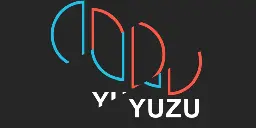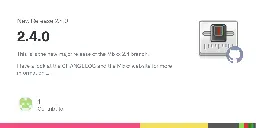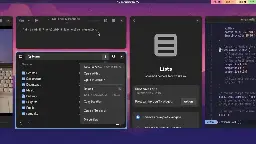but does it really matter where your personal project with maybe 10 stars resides? if not why not choose something like codeberg?
so why not do it from the beginning?
be careful. otherwise nintendo may even copyright claim the fruit
they can take your whole project down if they want so. or if they are forced to do so.
yuzu? suyu? does that ring a bell?
Of course it does. What a question...
boy this is clearly a lemonussy
add emails and chats to the list but shorten the period to, lets say, 4 years :)
And amazon, apple, meta, nvidia, half the gaming industry, ...
Die USA und Demokratie. Zwei Worte die nicht in einen Satz gehören.
Benefits - costs: If your benefits from having less spam and the work they are doing by solving the task are greater than your costs this is acceptable.
Discord has shut down the Discord servers for the Nintendo Switch emulators Suyu and Sudachi and has completely disabled their lead developers’ accounts
They dindn't learn anything did they? First hosting their forks on Github and then having their communities on Discrod. How brain damaged does one have to be to not see this coming?
I know them all but they can't hold up with their proprietary counterparts both by userbase and features.
- Digital wallets (for things like cc, ID, coupons)
- Map apps (like google maps)
- Dating apps
The Mixxx Board of Directors in pleased to announce plans to acquire the AlphaTheta Corporation (formerly known as Pioneer DJ), Serato Audio Research Ltd. and Native Instruments.
Hey fellow linux enjoyers,
today I found this interesting article which talks about rethinking the underlying data structures of an OS. I was always very enthusiastic about DBFileSystems but this approach takes it even a step further.
It comes with some serious caveats though.
Niri, the scrolling WM, now supports touch input
Nintendo is "basically taking the position that emulation itself is unlawful."

Seriously what is this? Nintendo argues that by instructing users how to extract the prod.keys from their own switch the yuzu developers are essencially infringing on the DMCA.
So what? Now you can't even freely use your own property anymore because it goes against the design intentions of some big company that just want's to milk their users?
> Nintendo goes directly after this argument in its lawsuit, arguing that buying a Switch game only means you "have Nintendo's authorization to play that single copy on an unmodified Nintendo Switch console."
This is is the new major release of the Mixxx 2.4 branch. Have a look at the CHANGELOG and the Mixxx website for more information: https://github.com/mixxxdj/mixxx/blob/2.4.0/CHANGELOG.md

Hello networking community
driven by the vision of a decentralised, independent and neutral network, I have set out into the depths of netowrking. I have compared different networks and tried to understand the underlying structures.
But my head is spinning from all the research and I've lost track a bit, which is why I'm turning to you. I would like to compare and categorise all these networks according to their protocols using the osi model.
I would be grateful if you could help me to fill in the following table as good as possible. You can simply copy it or write your answer in the comments.
| Network | WWW | Usenet | GNUnet | Freenet | I2P | Tor | ZeroNet | Lokinet | Internet Computer | |-------------|-----|--------|--------|---------|-----|-----|---------|---------|-------------------| | L1 | - | - | - | - | - | - | - | - | - | | L2 | | | | | | | | | | | L3 | IP | IP | | | | IP | | | | | L4 | TCP | | | | | | | | | | L5 | | | | | | | | | | | L6 | | | | | | | | | | | L7 | | | | | | | | | |
Hey
the cool scrolling wm which has just recently pushed out its first stable release is now following up with yet another interesting update.
Hey folks,
remember the post that was made a few months ago about an infinite canvas/scrollable WM? Here we have the stable release of a (onedirectional) scrollable one inspired by gnome's PaperWM.
Aaaand... ...it's written in Rust!
Hello everyone
Yes I know, a few months ago a post with the exact same title was shared in this community by @[email protected]. But this was at a time when lemmy was still quite small. I would like to give the topic new momentum.
From their wiki: > ListenBrainz is a project by the MetaBrainz foundation which allows you to publicly store a record of all of the songs that you listen to. Using this data, we provide statistics, recommendations, and a platform for you and other developers to explore this data.
Many of you probably use a music streaming service. You share your user data with the company anyway, and some of it with others. If you feel like it, you can make your data available to the general public and help other open source apps to build their services on this data. ___ Website: https://listenbrainz.org/ \ Wiki: https://wiki.musicbrainz.org/Main_Page \ Github: https://github.com/metabrainz/listenbrainz-server \ ListenBrainz Android:
- https://github.com/metabrainz/listenbrainz-android
- https://apt.izzysoft.de/fdroid/index/apk/org.listenbrainz.android
cross-posted from: https://lemmy.world/post/10542663
> Well to be precise: > - How does one install it? On a hypervisor? On a regular distro + KVM? > - Should I go with Proxmox/Debian/some other distro? > - I already installed Flatcar Linux, is this also suitable?
Well to be precise?
- How does one install it?
- What is the difference between a hypervisor/openstack/a container service (podman,docker)?
- Should I go with Proxmox/Debian/some other distro?
- I already installed Flatcar Linux, is this also suitable?


> cross-posted from: https://lemmy.world/post/10530523
Hello folks, ___ TL:DR
- Solid enables a dencentralized, user owned data storage and SSO
- ActivityPods adapts its functionality to the fediverse --- Slowly, things have smoothed out for the fediverse and it has become an everyday thing or even a new home on the internet for many of us. And yet I still don't feel that I can utilise the full potential of this network.
One of the biggest arguments in favour of the fediverse has always been that you can communicate with all other services regardless of which service you use and that it doesn't really matter where you register because you still receive all the messages. The reality is often disappointing.
Once registered with a service, you can communicate with all other services, but unfortunately often not in the format for which the other media were created. If you then try to log in to another instance with your account, you will also be disappointed - it simply doesn't work.
What we are really missing is a SingleSingOn (SSO) solution with which you can log in to any instance and any service. And it already exists! Meet the Solid project.
> Solid (Social Linked Data) is a web decentralization project led by Sir Tim Berners-Lee, the inventor of the World Wide Web. The project "aims to radically change the way Web applications work today, resulting in true data ownership as well as improved privacy" by developing a platform for linked-data applications that are completely decentralized and fully under users' control. (Source: Wikipedia, Solid)
In short: Solid stores all your data in a decentralised data store called "pod". Anyone can host their own pod or use a pod provider. The user can then decide which data is made available to which service and can adjust it centrally at any time without much effort. This is also accompanied by the authentication method through WebID, which is handled via the Solid OIDC protocol.
Solid is designed to revolutionise the entire internet, but specifically for the fediverse there is ActivityPods, which aims to combine the advantages of Solid with the nature of the fediverse. This project will probably be the one that will give us the long-awaited interoperability thanks to SSO. And probably as early as this year!


Hello folks, ___ TL:DR
- Solid enables a dencentralized, user owned data storage and SSO
- ActivityPods adapts its functionality to the fediverse --- Slowly, things have smoothed out for the fediverse and it has become an everyday thing or even a new home on the internet for many of us. And yet I still don't feel that I can utilise the full potential of this network.
One of the biggest arguments in favour of the fediverse has always been that you can communicate with all other services regardless of which service you use and that it doesn't really matter where you register because you still receive all the messages. The reality is often disappointing.
Once registered with a service, you can communicate with all other services, but unfortunately often not in the format for which the other media were created. If you then try to log in to another instance with your account, you will also be disappointed - it simply doesn't work.
What we are really missing is a SingleSingOn (SSO) solution with which you can log in to any instance and any service. And it already exists! Meet the Solid project.
> Solid (Social Linked Data) is a web decentralization project led by Sir Tim Berners-Lee, the inventor of the World Wide Web. The project "aims to radically change the way Web applications work today, resulting in true data ownership as well as improved privacy" by developing a platform for linked-data applications that are completely decentralized and fully under users' control. (Source: Wikipedia, Solid)
In short: Solid stores all your data in a decentralised data store called "pod". Anyone can host their own pod or use a pod provider. The user can then decide which data is made available to which service and can adjust it centrally at any time without much effort. This is also accompanied by the authentication method through WebID, which is handled via the Solid OIDC protocol.
Solid is designed to revolutionise the entire internet, but specifically for the fediverse there is ActivityPods, which aims to combine the advantages of Solid with the nature of the fediverse. This project will probably be the one that will give us the long-awaited interoperability thanks to SSO. And probably as early as this year!
Hello everyone,
I have been familiar with the ominous learning card software anki for a long time. Until now, I've always had a love-hate relationship with this program and have rarely used it. Now my life circumstances have changed and I am now more dependent on this software. And the more I immerse myself in it, the greater my disgust grows.
But I want to start on a positive note:
- Anki is (practically) the only open source educational software
- Anki is based on a sound learning approach
- Anki is extremely powerful and versatile
- Anki has a huge number of resources
- Anki is available on all platforms
- Anki is fast and efficient
Sounds fantastic, doesn't it? Well, from my point of view there are some big problems. Here is how I see it:
- Anki is overwhelming for beginners:A program is there to fulfil a specific task. In the case of anki, it is to provide an efficient and sustainable learning experience. It is expressly not there to spend days optimizing and setting up the program. All these things should happen automatically in the background. If I then want to adjust some parameters myself, I can still do that in the settings.
- Anki is cluttered and a nightmare to configure: the more numerous and complex the configuration options of a device or software are, the more indispensable a clear, intuitive, descriptive arrangement and a guiding design become: imho anki fails at all of these points miserably.
- The UI sucks and there is no easy way to change it: There is no way to change the appearance in the spplication settings. To do this, you have to rummage through numerous addons or fancy up the cards yourself with some shady hacks. All at the expense of performance, reliability and simplicity of the user.
- It is a chore to create, regroup or organize anki cards
- The parameters don't adapt comfortably to my learning process: for the fsrs algorithm you have to have no less than a thousand repetitions to optimize the deck. So that doesn't help me at all at the beginning. What's more, as a user, I don't want to know anything about the background processes at the beginning, I just want to learn)
- The defaults aren't well optimized: For example, why is the sm2 algorithm used by default and not fsrs if it is that far superior?
- It doesn't animate me to learn: Anki is really barebones andI totally agree with making the software as lightweight and efficient as possible, but a good learning program also requires good progress analysis. How often, how quickly, how efficiently or which specific topics you have learned enable you to reflect on your learning process and motivate.
- Spaced repetition does not always have to be in the form of flashcards. Multiple choice, cloze texts and other gamification options can not only loosen up learning but also create connections and promote memorization.
- Spaced repetition is by no means everything. Remembering facts alone is usually of little use in life. In my opinion, chunking and other learning methods are essential complements that should also be taken into account.
Can someone help me to fix these problems in anki as good as possible? I know a lot is personal and also card/deck dependent but maybe I'm missing some obvious things?
Thanks in advance!
Hello everyone
Since the announcement of threads to join the fediverse and the resulting discussions I have been thinking about the matter of content distribution and filtering in the fedi. Here is a possible solution to it.
In essence, one can distinguish between server-based and user-based content filtering.
server-based content filteringregulates which instances federate with each other and which content is cached on the own instance.user-based content filteringregulates what content the end user sees.
Content can also be categorized, for example, according to its origin. Sorted according to the quantity produced, there would be:
- instances
- communities/tags
- users/channels
From this I then derive the following behaviour:
server based content filteringshould be used when servers want to prevent certain content from being cached or when they want to set up a small exclusive gated community with a few selected federated instances.user-based content filteringshould allow granular filtering of all the above content groups with the help of white and blacklists. This could look something like this:
| | instances | communities | users | | -------------- | ----------- | --------------- | ------ | | blacklisted | | | | | whitelisted | | | |
Each field could contain a drag and drop function or a field for importing a blocklist as well as a search function to find instances/communities/users. Instances could also define in advance which default settings an account created with them could come configured with. The instances defederated by the server could optionally be displayed with a checkbox, but then in a grayed out look to make it clear that they cannot be changed by the user.
What do you think?
I just learned some good news: Firefox 103 users can switch the case (B) to case (A) using a setting. Could you make this change, turn off the extension(s), and test again? Here's how you can check on that: (A) In a new tab, type or paste about:config in the address bar and press Enter/Return. Click...

Hey guys
Today I got so annyed by firefox's default behaviour of downloading each and every PDF file to my disk that I went searching for a solution until I had the problem fixed. And it seems like I have finally found it. I have linked the solution but here is the explanation in short:
Firefox determines what kind of file type it is based on the content-type header it receives from the server. Another header is the content-disposition header with which the server specifies how the file should be handled. The two most important options here are attachment and inline.
inlineis the default if not otherwise specified, and means the browser will handle the file according to the behavior set in the browser settings.attachmentmeans to always download the file
It is therefore possible that some pdf files are downloaded by force and others are handled according to the behavior specified in the settings. To force the latter in any case, you can proceed as follows:
- go to about:config
- change browser.download.open_pdf_attachments_inline to true
Thank you jscher2000 for the solution! ___ cross-posted from: https://lemmy.world/post/9785046
I just learned some good news: Firefox 103 users can switch the case (B) to case (A) using a setting. Could you make this change, turn off the extension(s), and test again? Here's how you can check on that: (A) In a new tab, type or paste about:config in the address bar and press Enter/Return. Click...

Hey guys
Today I got so annyed by firefox's default behaviour of downloading each and every PDF file to my disk that I went searching for a solution until I had the problem fixed. And it seems like I have finally found it. I have linked the solution but here is the explanation in short:
Firefox determines what kind of file type it is based on the content-type header it receives from the server. Another header is the content-disposition header with which the server specifies how the file should be handled. The two most important options here are attachment and inline.
inlineis the default if not otherwise specified, and means the browser will handle the file according to the behavior set in the browser settings.attachmentmeans to always download the file
It is therefore possible that some pdf files are downloaded by force and others are handled according to the behavior specified in the settings. To force the latter in any case, you can proceed as follows:
- go to about:config
- change browser.download.open_pdf_attachments_inline to true
Thank you jscher2000 for the solution!
Hey all
A few years ago, when I started my journey into the realm of open source, decentralisation and privacy as an ignorant, naïve young internet user, I had already registered with numerous companies without giving it much thought. I randomly signed up for services using my google and microsoft email addresses, which I opened when I was very young.
I have been struggling with this naivety and carelessness of my younger self for several years now. During this time I have gone through all the services I have ever registered for, requested my data everywhere, written dozens of emails, deleted my google account a year ago, then the amazon account, my apple account and yesterday now also the microsoft account, together with the email I have used the longest and replaced everything with open source, privacy respecting services.
Now there's only one big player missing, as you can imagine. Yes, Meta has me in its grip like no other company with its chat service WhatsApp. I myself would have been ready to finally ditch this increasingly bad service long ago unfortunately, those around me don't see it the same way.
But I have now started my preparations:
- I have cleared out, structured and organised all my contacts.
- I have said goodbye to all long-dead groups.
And now comes the exciting part: \ in the near future, I will write a message to my most important contacts explaining that WhatsApp, with all its clutter, has become a burden for me and that there are better, privacy-respecting alternatives. I will suggest Signal to them and explain that I will slowly withdraw from WhatsApp. I won't be on the platform as often, but I'll still be available for emergencies. And that they should take a look at this very familiar looking app. their data and I will thank them for it :)
In conclusion, I would like to say that I have realised that you can achieve anything, not radically, but in incremental steps. Especially when others are affected, you have to give them space and time to familiarise themselves with the alternatives without having to deviate from your own convictions. And if there is no other way and if they are also averse to this plan in the long term, new ways will be found. I have already lived without a mobile phone for more than half a year a few times and have also managed that.
What do you think? I'm interested in your opinion :)







